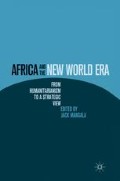Abstract
Contemporary Africa contains huge variations across its many states: some states are relatively stable while others have endured protracted conflicts, some have rapidly expanding economies while others are in reverse gear, and some are stable democracies while others are among the most authoritarian on the planet. In such a varied continent it is not surprising that the British government does not have a single Africa policy. Instead, it has engaged with many different “Africas” and adopted a wide range of policy instruments—from military operations to budget support.
Access this chapter
Tax calculation will be finalised at checkout
Purchases are for personal use only
Preview
Unable to display preview. Download preview PDF.
Notes
Rita Abrahamsen and Paul Williams, “Ethics and Foreign Policy: The Antinomies of New Labour’s ‘Third Way’ in Sub-Saharan Africa,” Political Studies, 49:2 (2001), 249–264.
Paul Williams, “Britain and Africa after the Cold War” in Africa in International Politics, ed. Ian Taylor and Paul Williams (Abingdon: Routledge, 2004), 41–60.
Paul D. Williams, British Foreign Policy under New Labour, 1997–2005 (Basingstoke: Palgrave Macmillan, 2005).
Institute for Public Policy Research (IPPR), Shared Responsibilities: A National Security Strategy for the UK (London: IPPR/National Security Commission, 2009).
Cabinet Office, Security in an Interdependent World (London: TSO Cm 7291, the National Security Strategy ofthe United Kingdom, 2008), par. 1.9.
Cabinet Office, Security for the Next Generation (London: TSO Cm 7590, the National Security Strategy ofthe United Kingdom: Update June 2009).
David Styan, “The Security of Africans beyond Borders,” International Affairs, 83:6 (2007), 1185–1186.
Camilla Toulmin, Climate Change in Africa (London: Zed, 2009).
Mark Malloch Brown, “Africa: Weathering the Storm, Charting Recovery,” speech at the Joaquim Chissano Centre, Mozambique, June 9, 2009, at www.fco.gov.uk/en/newsroom/latest-news/?view=Speech&id=19159107.
DFID, Eliminating World Poverty: Building Our Common Future (London: The Stationery Office, Cm 7656, 2009), 24.
Rita Abrahamsen, “A Breeding Ground for Terrorists? Africa and Britain’s ‘War on Terrorism,’” Review of African Political Economy, 32:102 (2004), 178–192, and “Blair’s Africa: The Politics of Securitization and Fear,” Alternatives, 30:1 (2005), 55–80.
HMG, PSA Delivery Agreement 30 (London: The Stationery Office, 2007), par. 1.2.
Douglas Alexander, “Conflict, Fragile States and Security,” speech in New York, April 27, 2009, at www.dfid.gov.uk/Media-Room/Speeches-and-articles/2009/Conflict-fragile-states-and-security/.
Stabilisation Unit, The UK Approach to Stabilisation (London: Stabilisation Unit, 2008), p. 8 at www.stabilisationunit.gov.uk/resources/Stabilisation_guide.pdf.
See Alex de Waal ed., War in Darfur and the Search for Peace (Harvard, MA: Harvard University Press, 2007), chapters 8–11.
Catherine Barnes, Bridging the Gap: Improving UK Support for Peace Processes (London: Conciliation Resources Working Paper, 2007).
Adam Ingram, Hansard, column 698W, July 8, 2003, at www.publications.parliament.uk/pa/cm/cmhansrd.htm.
Cabinet Office, Investing in Prevention (London: The Prime Minister’s Strategy Unit, 2005).
Report of the UN Secretary-General (UNSG), Implementing the Responsibility to Protect (New York: UN doc. A/63/677, January 12, 2009).
Foreign and Commonwealth Office (FCO), Governance in Africa: What Do We Mean and Why Does It Matter? (London: FCO Africa Research Group, 2004), at www.fco.gov.uk/resources/en/pdf/research-africa-governance-2007.
Commission for Africa (CFA), Our Common Interest (London: DFID, 2005).
Tom Porteous, Britain in Africa (London: Zed, 2008), 18.
Richard Dowden, “An Alien Inheritance,” Prospect, Issue 150 (September 2008).
Lewis Mwanagombe, “Ex-Zambian Leader Acquitted of Corruption Charges,” Associated Press, August 17, 2009.
David Smith, “Former Zambian President Cleared of Corruption Charges,” Guardian, August 17, 2009, at www.guardian.co.uk/world/2009/aug/17/zambia-chiluba-cleared-corruption.
HMG, PSA Delivery Agreement 29 (London: The Stationery Office, 2007), par. 1.1.
Robert Dixon and Paul Williams, “Tough on Debt, Tough on the Causes of Debt? New Labour’s Third Way Foreign Policy,” British Journal of Politics and International Relations, 3:2 (2001), 150–172.
DFID, Statistics on International Development 2003/04–2007/08 (London: DFID/National Statistics, 2009), 147.
HMG, Partnerships for Poverty Reduction: Rethinking Conditionality (London: DFID, FCO and HM Treasury, 2005), par. 1.3.
DFID, Statistics on International Development (2009), 8, 26–27.
DFID, Statistics on International Development, 2002/03 to 2006/07 (London: DFID/National Statistics, 2007), 125.
DFID, Statistics on International Development (2009), viii.
World Health Organization (WHO), WorldHealth Report 2006 (Geneva: WHO, 2006).
DFID, Statistics on International Development (2007), 27–29.
Joel Barkan, “Rethinking Budget Support for Africa” in Smart Aid for Development in Africa, ed. Richard Joseph and Alexandra Gillies (Boulder, CO: Lynne Rienner, 2009), 68.
See Paul D. Williams, “Blair’s Commission for Africa: Problems and Prospects for UK Policy,” Political Quarterly, 76:4 (2005), 529–539.
William Brown, “The Commission for Africa: Results and Prospects for the West’s Africa Policy,” Journal of Modern African Studies, 44:3 (2006), 349–374.
Christopher Clapham, “Introduction,” International Affairs, 81:2 (2005), 277.
Richard Joseph and Alexandra Gillies eds., Smart Aid for African Development (Boulder, CO: Lynne Rienner, 2009).
Ian Taylor, “Advice is Judged by Results, Not by Intentions: Why Gordon Brown Is Wrong about Africa,” International Affairs, 81:2 (2005), 299–310.
Editor information
Copyright information
© 2010 Jack Mangala
About this chapter
Cite this chapter
Williams, P.D. (2010). Britain and Africa in the Twenty-First Century. In: Mangala, J. (eds) Africa and the New World Era. Palgrave Macmillan, New York. https://doi.org/10.1057/9780230117303_3
Download citation
DOI: https://doi.org/10.1057/9780230117303_3
Publisher Name: Palgrave Macmillan, New York
Print ISBN: 978-1-349-28735-2
Online ISBN: 978-0-230-11730-3
eBook Packages: Palgrave Political & Intern. Studies CollectionPolitical Science and International Studies (R0)

